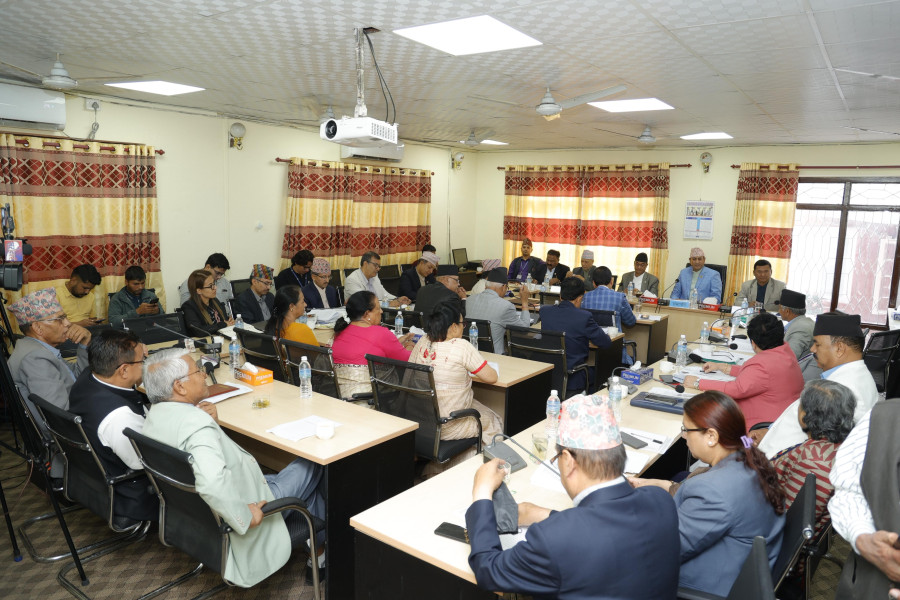National
Federal Civil Service Bill moves on after deal at parliamentary panel
Retirement age raised, cooling-off period set. Bill lays ground for administrative federalism.
Binod Ghimire
Nearly 10 years after the promulgation of the Constitution of Nepal that institutionalised federal republicanism, a parliamentary committee has finalised the long-awaited Federal Civil Service bill, which is a must for implementing administrative federalism.
The State Affairs and Good Governance Committee of the House of Representatives endorsed the bill on Friday following multiple sittings and deliberations among cross-party top leaders and lawmakers. The bill was finalised after an agreement between Prime Minister and CPN-UML Chairman KP Sharma Oli and Nepali Congress President Sher Bahadur Deuba over the retirement age of civil servants and the cooling-off period.
“The two top leaders, together with the chairperson of the House committee and other members, reached an agreement on the two contentious issues on Thursday evening, leading to the bill’s endorsement,” Padam Giri, a UML lawmaker in the committee, told the Post. “We had already reached an agreement on other provisions.”
If the bill gets through the plenary of the federal parliament, civil servants will retire at the age of 60 years, up from the existing 58 years. This provision, however, will be implemented gradually. The retirement age will continue to be 58 years until the fiscal year the bill gets endorsed. It will then rise to 59 years and 60 years respectively in the succeeding fiscal years.
Similarly, the House committee has also agreed to impose a two-year cooling-off period after the retirement of the civil servants before they can be appointed to any constitutional position. There was sharp division among the parties over the duration of the period. On several instances the civil servants have been appointed in constitutional positions shortly after retirement.
The erstwhile Pushpa Kamal Dahal government had registered the bill in the lower house on March 4 last year. It was forwarded to the House committee on May 28 after theoretical discussions. A total of 1,583 amendments were registered to the bill by lawmakers
“After rounds of negotiations and deliberations we have endorsed the bill. It will soon be forwarded to the House of Representatives for endorsement,” Ram Hari Khatiwada, chair of the House committee, told the Post.
The bill envisions that the provincial civil service will appoint chief administrative officers in the local units under the respective provinces. However, the federal government will depute them until the provinces start their own recruitments. The federal government will depute such officers in bulk, and the provincial governments will assign them to respective local units. This arrangement can continue for a maximum of 10 years. Such officers can be transferred between provinces once during their service period.
As demanded by the provinces, the provincial secretaries have been placed under the provincial governments. However, for the time being they will be deputed by the federal government. The provincial principal secretaries will continue to be under the federal government.
The bill also envisions reviving the additional secretary’s position in the civil service.
According to the bill, additional secretaries will be ranked above joint secretaries and below secretaries. They will be in the 13th level of the civil service. Secretaries will be at the 14th level, and the chief secretary will be at the 15th level. These three positions will fall under the gazetted special category.
Though there was such a provision during the Panchayat regime, it was removed after the restoration of democracy in 1990.
The bill has proposed ending the provision of recruiting joint secretaries through open competition. When the bill gets endorsed, under-secretary will be the highest position for lateral entry in the country’s bureaucracy.
The House committee has also agreed to give continuity to 35 years as the maximum age limit for entry in the civil service for men, and 39 years for women (which is currently 40 years). It has also decided to lower the tenure of secretaries to four years from five and that of the chief secretary from three to two years.
Despite the demand to curtail trade unionism, the parties have decided not to do so. The parties had been facing intense pressure from the civil servants to continue them. Last month, representatives of the trade unions affiliated to six political parties, including the ruling UML and Congress, had submitted a memorandum to Khatiwada, demanding the continuation of trade unions.




 13.12°C Kathmandu
13.12°C Kathmandu














